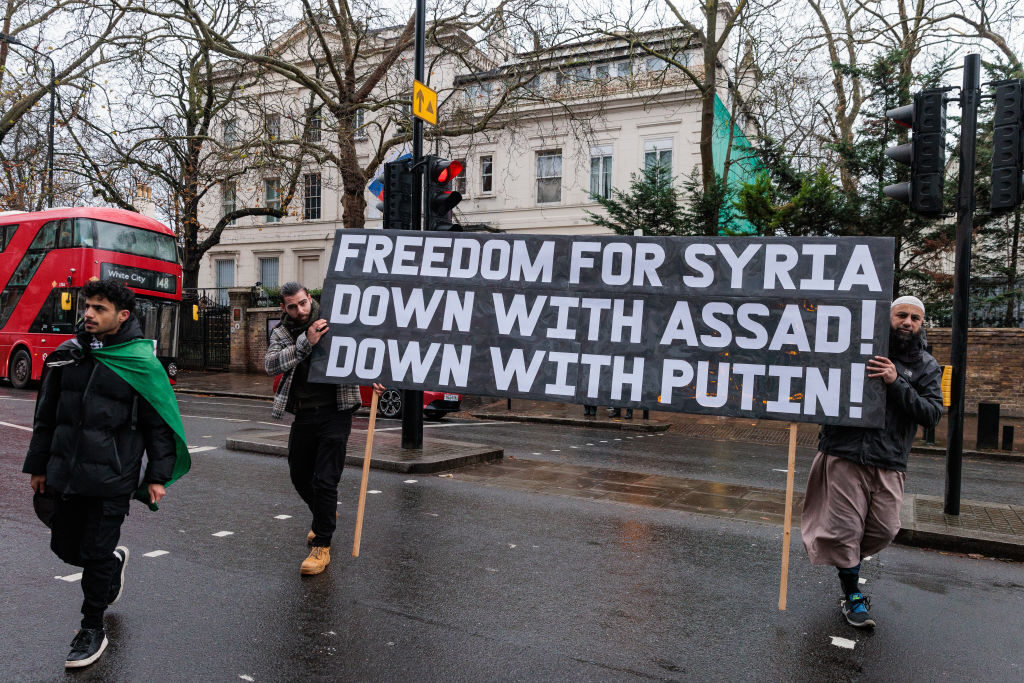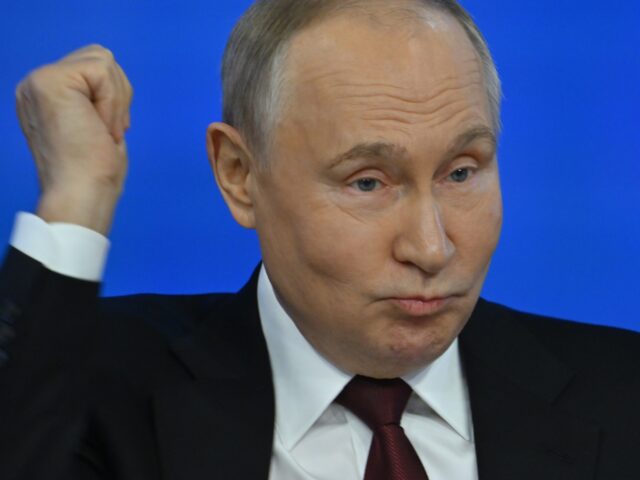Russian strongman Vladimir Putin insisted on Thursday that Russia achieved its strategic goals with its military presence in Syria even with the collapsed of the regime of ally Bashar Assad – who has since fled to Moscow, where Putin promised to meet with him soon.
Putin made the remarks during his traditional end-of-year press conference, a marathon event that this year approached the five-hour mark. Putin typically holds the event in late December every year, though he canceled the 2022 edition in the aftermath of the full-scale Russian military invasion of Ukraine.
In addition to discussing the situation in Syria, Putin spoke extensively on his invasion of Ukraine, what he hopes to see from his relationship with the incoming administration of President-elect Donald Trump, and domestic issues such as Russia’s low birth rate.
Syria was among the most discussed issues in questions from reporters, which included both regime-approved domestic reporters and a small sampling of international journalists. Russia has maintained a presence in Syria for over a decade with the blessing of the Assad regime and continues to operate two military bases there, Putin confirmed, after Assad fled the country on December 7.
Given the long-term investment Putin made in Assad’s rule, international experts have often named Russia among the biggest losers of the fall of the Assad regime. Putin insisted on Thursday that that was not the case, arguing that the ultimate mission Russia hoped to complete in Syria was to prevent it from becoming a hotbed of terrorism and that it had succeeded in doing that.
“We have come to Syria ten years ago so in order to prevent the creation of a terrorist enclave the likes of which we’ve seen in other countries – for example, in Afghanistan,” Putin said. “In general, we have achieved our goal. Even those groups that used to fight with the Assad regime, with the governmental forces, they have evolved as well.”
Putin appeared to be referring to Hayat Tahrir al-Sham (HTS), the al-Qaeda offshoot terrorist organization that ultimately defeated Assad. Syria had been in a state of civil war since 2011, when widespread protests erupted in the country and Assad responded with a barbaric crackdown on political dissidents. The war evolved into a complex melee featuring as many as ten different militias, states, and other political actors, some fighting each other outside of the context of the war against Assad.
HTS is a U.S.-designated terrorist organization led by Ahmed al-Sharaa (formerly known as Abu Mohammed al-Jolani), who has a $10 million U.S. bounty on his head. In late November, HTS launched a surprise attack on Aleppo, Syria’s second-largest city, and seized it with minimal resistance from Assad’s forces. By December 7, HTS jihadists announced they had reached the outskirts of Aleppo, sending Assad fleeing to Russia.
Since the collapse of the regime, Sharaa has abandoned his nom de guerre and jihadist outfits, wearing Western-style suits and insisting that his Islamist regime would be “inclusive.” Multiple free states, including America, have reportedly sought conversations with what will likely become the new Syrian government.
“It is for a reason that today many European countries and the United States would like to establish relations with them,” Putin told reporters. “If they are a terrorist organization, how come you are trying to do that? Then that means that they have changed.”

Supporters of Syria Solidarity Campaign cross the road in front of the Russian embassy holding a large sign during a protest against the Russian bombing of Idlib on 7th December 2024 in London, United Kingdom. (Mark Kerrison/In Pictures via Getty Images)
If HTS is no longer a terrorist group, Putin concluded, “that means that, to a certain extent, our goal has been achieved.”
After Assad fled to Moscow, the Russian government claimed that he chose to resign and flee the country, adding that Putin personally approved political asylum for himself and his family. A letter surfacing on social media on Monday, however, alleging to have been written by Assad claimed the dictator never resigned or chose to flee and was forced onto aircraft out of Syria by Russian military officials.
Putin did not belay any tensions between himself and Assad in his commentary, promising to meet Assad in person soon.
“To be frank, I have not met President [sic] Assad yet after his arrival to Moscow,” Putin said, “but I have such plans, I will speak to him for sure.”
Putin added that, in conversations with Assad, he would bring up the case of Austin Tice, an American journalist who disappeared in Syria in 2012 and is believed to have been imprisoned in one of Assad’s notorious torture facilities. Putin expressed skepticism that Assad knows what happened to Tice, however, and suggested that American officials should also address the issue with HTS.
Regarding Russia’s future in Syria, Putin suggested he hoped to maintain military bases there but was aware that, “if we stay there, then we must do something which is in the interests of the hosting country.” He suggested using Russian military bases to distribute humanitarian aid to war-torn areas.
Follow Frances Martel on Facebook and Twitter.

COMMENTS
Please let us know if you're having issues with commenting.